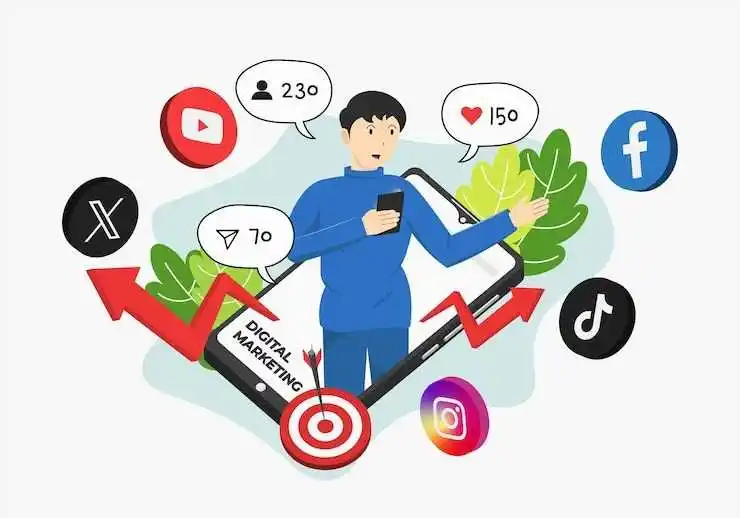Table of Contents
The best platform to help businesses make the most of social media marketing. We understand different types of products and have strategies designed just for you. Let's explore how we can help you:
What Is Social Media Marketing (SMM)?
Social media marketing, also referred to as digital or e-marketing, uses social platforms where users connect and share information to help businesses build their brand, boost sales, and drive web traffic. Beyond offering companies a way to engage with current customers and reach new ones, social media marketing provides purpose-built data analytics that allow marketers to track the success of their efforts and uncover additional opportunities to foster audience engagement.
Why Is Social Media Marketing (SMM) Important?
Social media marketing has become a critical component of modern marketing strategies for several key reasons. First, it allows businesses to reach a vast and diverse audience cost-effectively, often with highly targeted messaging. This can include using influencer marketing by partnering with industry experts, celebrities, or social media influencers to promote products or services to their engaged followers. Second, social platforms provide rich data and analytics that enable marketers to better understand their customers and optimize campaigns, whether that's measuring engagement on YouTube videos, Instagram Reels, or Facebook and Twitter posts.
Third, social media facilitates real-time engagement and two-way communication with consumers, fostering brand loyalty and trust through authentic interactions. This could involve responding to comments on sponsored posts on Instagram or sharing behind-the-scenes content on Facebook. Finally, a strong social media presence increases overall online visibility and brand awareness, which can translate into increased website traffic, leads, and sales. In today's digital landscape, a well-executed SMM strategy that incorporates influencer collaborations and a variety of social content is essential for business growth and competitiveness.
The Evolution Of Social Media Marketing Throughout The Years
The evolution of social media marketing reflects its transition from simple, broadcast-style brand advertising to sophisticated, engagement-driven strategies. Initially, businesses used platforms like Facebook and Twitter as digital billboards, posting content to a broad audience with hopes of driving sales. Over time, as platforms evolved and user behavior shifted, marketers started focusing on creating value and fostering genuine interactions.
![evolution of social media marketing]()
Initially, marketers used social media like digital billboards, just posting ads and hoping to drive website traffic and sales. But as social media became more crowded, simply posting wasn't enough. Now, standing out requires providing value and engaging with audiences in meaningful ways.
Fortunately, with new tools and strategies available on social platforms, this process has become both easier and beneficial. For example, a company worried about what people are saying about them might monitor social media conversations and respond to comments (this is called social listening and engagement).
A company wanting to know how well they're doing on social media would use tools to track how many people they're reaching, how much they're engaging with people, and how much they're selling from social media activities. Another company aiming to target certain groups of people might run targeted ads to reach them more effectively.
All these actions together make up today's approach to managing social media.
Why Should Brands Consider Social Media Marketing?
1. Increased Brand Awareness: Social media platforms provide a vast and highly accessible audience for brands to promote their products, services, and overall brand identity. By using social media, brands can reach a broader audience, raise awareness about their offerings, and establish their presence in the digital landscape.
![social media marketing]()
2. Audience Engagement and Relationship Building: Social media enables brands to engage directly with their target audience, fostering two-way communication and building relationships. By responding to comments, messages, and mentions, brands can create a sense of connection, trust, and loyalty among their followers.
3. Increased Customer Support: Social media platforms serve as an accessible and convenient channel for customers to seek support, ask questions, and provide feedback. Brands can utilize social media to promptly address customer inquiries, resolve issues, and provide exceptional customer service, thereby enhancing the overall customer experience.
4. Content Distribution and Promotion: Social media offers brands an effective way to distribute and promote their content. Brands can share valuable and engaging content such as blog posts, articles, videos, and infographics, attracting audience attention and driving traffic to their websites or other online platforms.
5. Influencer Marketing: Collaborating with influencers or celebrities on social media can help businesses reach a wider audience and use the influencer's credibility and following. By partnering with relevant influencers, businesses can tap into their influence and benefit from increased brand exposure and engagement.
6. Brand Reputation Management: Social media plays a significant role in shaping a brand's reputation. Brands can monitor and manage their online reputation by addressing customer concerns, managing feedback, and proactively addressing any negative sentiment to maintain a positive brand image.
How Does Social Media Marketing Work?
![how-does-social-marketing-work]()
Social media platforms like Facebook, X (formerly Twitter), and Instagram have fundamentally changed how people connect and how businesses can influence consumer behavior. These platforms allow companies to promote content that drives user engagement. They also provide businesses with valuable geographic, demographic, and personal information about users, which enables companies to craft messaging that resonates more effectively with their target audience.
In essence, social media marketing (SMM) uses the unique capabilities of social media to raise brand awareness, foster relationships with customers, and ultimately influence consumer purchasing decisions. By strategically creating and distributing compelling content, businesses can increase online engagement and use user data to deliver highly personalised marketing campaigns.
Advantages and Disadvantages of Social Media Marketing
![advantages and disadvantages of smm]()
Advantages of SMM
- Broad Reach: Social platforms grant access to vast audiences, enhancing brand visibility and recognition.
- Affordable: It's a cost-effective way to market, especially good for small businesses or startups.
- Connects with Customers: You can talk directly with customers, building stronger bonds and loyalty.
- Increases Website Visitors: Posting links on social media can lead more people to your website and help you make more sales.
- Quick Feedback: You can get feedback from customers right away, making communication easier.
- Targets Specifically: Social media allows you to reach specific people by using their interests and behaviors to show them your content.
- Boosts Engagement: It encourages interactions such as likes, shares, and comments, helping you reach even more people, including those who haven't discovered your brand yet.
Disadvantages of SMM
- Demanding: It takes a lot of ongoing work to keep up a strong social media presence.
- Need for Expertise: Understanding and succeeding on different social media platforms requires specific knowledge and skills.
- Ever-Changing Landscape: Social media sites are always changing the rules, making it hard to keep up and succeed consistently.
- Risk of Negative Feedback: Customers can publicly post complaints, which can harm a brand's reputation if not handled correctly.
- Hard to Measure Success: It's not always clear how effective social media marketing is because it's tough to measure the results accurately.
|
Pros
|
Cons
|
|
Increases brand visibility efficiently
|
Time-intensive to establish and upkeep
|
|
More budget-friendly with wide exposure
|
Unpredictable due to frequent platform algorithm changes
|
|
Increases website traffic and direct customer feedback
|
Risk of publicizing negative feedback
|
|
Allows for precise targeting and engagement
|
Challenging to accurately measure the true ROI
|
Social Media Marketing Made Simple: A Strategy Planning Guide
Creating an effective social media marketing strategy is key for expanding your business’s reach online. Here’s a straightforward approach to building a social media plan:
1. Define Your Goals
What do you want to achieve with social media? This could be increasing your brand's visibility, bringing more visitors to your site, getting new leads, selling more products, enhancing customer interaction, or offering support. Set clear, trackable goals.
2. Understand Your Audience
Know who you're talking to. Use tools on social media sites to gather information about your audience's likes, dislikes, and habits. This helps in tailoring your content to meet their preferences.
3. Check Out the Competition
Look at what your competitors are doing on social media. Identify what works for them and what could work better. This information can help you spot opportunities to stand out.
4. Choose the Right Platforms
Pick social media platforms based on where your target audience spends most of their time. For example, LinkedIn is great for business-to-business interactions, while Instagram might be better for visual products.
5. Plan Your Content
Decide what you’ll post. Your content should vary–mix educational pieces with promotional posts and engaging media like videos. Use a content calendar to keep your posting schedule organized.
6. Manage Resources
Figure out what you need to put your plan into action. This might include hiring social media professionals, investing in design tools, or setting aside a budget for ads.
7. Launch and Monitor
Start your social media strategy and keep an eye on how it's doing. Measure your success with relevant metrics such as likes, shares, and sales. Adjust your approach based on these insights.
8. Interact with Your Audience
Social media is a two-way street. Make an effort to respond to comments and messages. Appreciate any content your followers contribute.
9. Keep Improving
Stay current with the latest social media trends and updates. Regularly tweak your strategy to include new tactics and improve based on audience feedback.
How to Involve Celebrities in Your Social Media Marketing Strategy?
Integrating celebrities into your social media marketing strategies can significantly amplify your brand's visibility and appeal. Here’s how you can seamlessly incorporate celebrity endorsements–such as video ads, image campaigns, and event appearances–into the social media strategies mentioned above, using platforms like Instagram and YouTube for optimal impact:
![social media marketing strategy]()
1. Content Calendar Planning
Incorporate celebrity-endorsed posts strategically into your content calendar. Align these posts with product launches or important campaigns to generate excitement. For example, scheduling a celebrity video ad on YouTube during a product launch week can maximize impact.
2. Target Audience Analysis
Ensure the celebrity's fan base aligns with your target audience's demographics and interests. This alignment increases the likelihood that the message resonates and drives engagement.
3. Engagement-Driven Initiatives
Use celebrities in interactive content like live Q&A sessions on Instagram or Facebook. This can increase participation rates and make the interactions more meaningful and engaging to the audience.
4. Brand Advocacy Programs
Encourage celebrities to share their genuine experiences with your product on their social channels. These authentic endorsements can be more effective than scripted advertisements in building trust with potential customers.
5. Influencer Collaboration
While working with celebrities as influencers, distinguish between mere endorsements and deeper collaborations. Develop signature lines or co-created content, like special edition products, which can be promoted via Instagram stories or YouTube videos.
6. Visual and Video Content
Deploy high-quality video advertisements featuring celebrities on platforms like YouTube to capture attention. Similarly, use visually striking images with celebrities for Instagram posts to improve the aesthetic appeal and shareability.
7. Social Media Analytics
Measure the effectiveness of campaigns involving celebrities by tracking engagement metrics and conversion rates on posts and ads featuring them. This data helps in understanding the contribution of celebrity endorsements to overall campaign performance.
8. Diverse Content Formats
Share behind-the-scenes content from celebrity-endorsed ad shoots on Instagram stories or make exclusive celebrity interview videos for IGTV or YouTube. Such content can provide fans a closer look at their favorite stars, deepening engagement.
9. Social Listening Practices
Use social listening tools to monitor how celebrity endorsements are being received by the audience. Track mentions of the celebrity's name in the context of your brand and adjust strategies based on the sentiment and feedback.
10. Paid Social Advertising
Use targeted ads featuring celebrities on Facebook, Instagram, and YouTube. These platforms offer advanced targeting options to ensure the content reaches the intended audience, enhancing the ad's effectiveness.
Using Celebrities for Social Media Marketing
Incorporating celebrities into your social media strategy can greatly increase your brand's prestige and appeal. Celebrities can help in:
- Expanding Reach: Celebrities come with their extensive followings, which can introduce your brand to a broader or different demographic.
- Building Credibility: Association with a respected and well-liked celebrity can lend credibility and a sense of trustworthiness to your brand.
- Driving Engagement: Celebrities can ignite conversations and interactions at much higher rates because of their high engagement levels with followers.
- Increasing Conversion Rates: The aspirational quality associated with celebrities can motivate followers into purchasing decisions, especially when celebrities genuinely endorse the product.
How To Measure the Success of Your Social Media Marketing Strategy?
You’ve been posting regularly, but how do you know if your social media strategy is actually working? It's not just about looking busy online, but it's about tracking the right numbers that show real progress. These metrics help you understand what’s connecting with your audience and what needs to change.
Here are ten simple and effective ways to measure how your strategy is performing:
1. Engagement
This includes likes, comments, shares, replies, and clicks. High engagement means your content is interesting or useful to your audience. If people are interacting, you’re doing something right.
2. Reach
Reach shows how many unique users have seen your content. It helps you understand how far your content is spreading. A growing reach usually means your brand is getting noticed by new people.
3. Followers
Your follower count shows how many people want to keep up with your updates. A steady or growing number means your content is worth subscribing to. But don't chase numbers–focus on attracting the right audience.
4. Impressions
Impressions track how often your content is shown, even if people don’t click or engage. It’s useful to see how often your posts are appearing in feeds and how visible your brand is overall.
5. Video Views
If you’re posting videos, views show whether people are stopping to watch. Track not just how many people start watching but also how long they stay. This can tell you if your content is grabbing attention or not.
6. Profile Visits
When someone visits your profile, they’re curious to learn more. This can lead to follows, clicks to your website, or even purchases. It’s a strong sign of interest.
7. Mentions and Tags
If people are tagging your brand or mentioning you in their content, it means they’re thinking about you–and sharing that with others. This is great for visibility and trust.
8. Reposts
When someone reposts your content to their own feed, it shows your message is strong enough to share. It also puts your brand in front of a new audience.
9. Shares
Shares are a key metric. They show that your content is valuable or relatable enough for someone to pass along to friends or followers. It’s one of the strongest forms of organic growth.
10. Click-Through Rate (CTR)
CTR shows how many people clicked on a link in your post—whether it's to visit your website, a product page, or a sign-up form. It helps you understand how effective your content is at driving action. A higher CTR usually means your call-to-action is clear and your content is motivating people to take the next step.
To grow your brand and boost results, use content that gets people to react, respond, and remember. Keep checking these metrics regularly, and adjust your strategy based on what the numbers are telling you.
Depending on where your business is at, you'll care about different numbers:
- If you're just starting, work on getting noticed and getting more followers.
- If you're growing, try to build trust with more likes, comments, and chats.
- If you're already known, keep people interested, and chatting with you.
- If you're selling something new, focus on getting people to talk to you directly and click on your links.
Do You Want to Promote Your Brand on Social Media via Influencers or Celebrities?
Thinking about promoting your brand on social media through influencers or celebrities? We can help you make it happen. At Tring, we match you with the right names who speak to your audience. From planning to execution, we keep it simple and effective.
Let’s talk and build something that actually works for your brand.
![]()
![birthday occasion]() Birthday Gifts
Birthday Gifts
![anniversary occasion]() Anniversary Gifts
Anniversary Gifts
![women]() Women
Women
![men]() Men
Men
![Couples]() Couples
Couples
![Couples]() Wedding Gifts
Wedding Gifts

 Birthday Gifts
Birthday Gifts
 Women
Women
 Men
Men
 Anniversary Gifts
Anniversary Gifts
 Wedding Gifts
Wedding Gifts







 We now support international payments
We now support international payments
